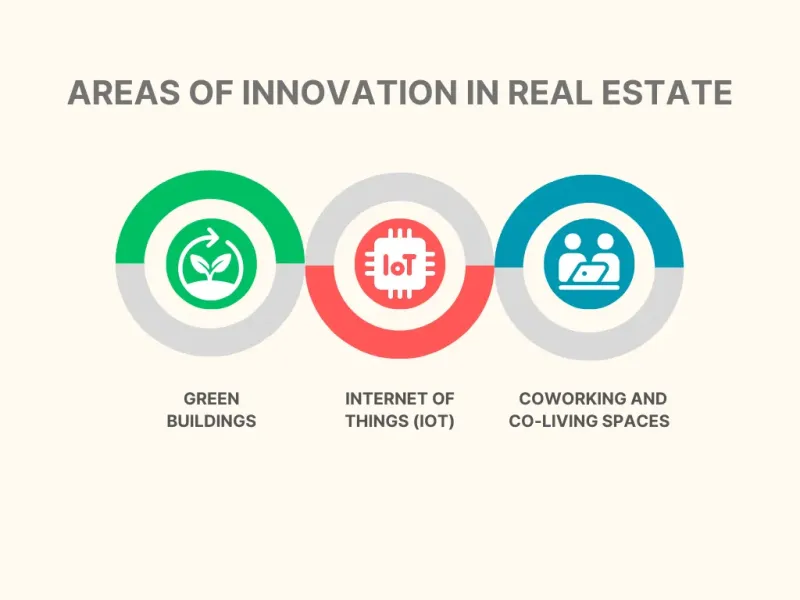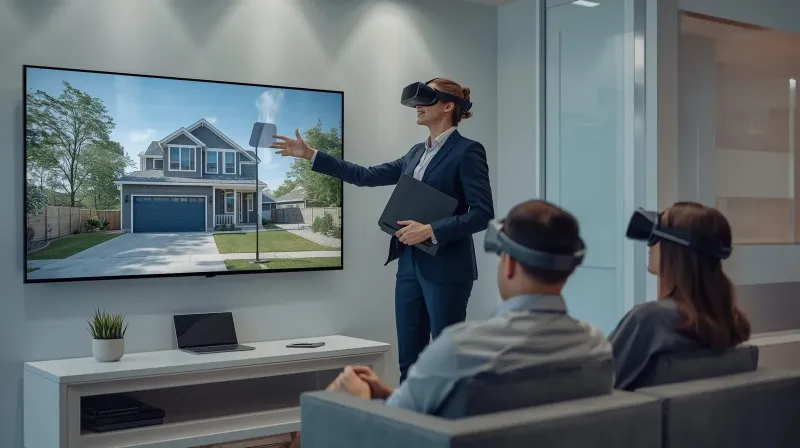It is hard to find a business sector that hasn’t been affected by technological innovations these days. The real estate sector is also being transformed profoundly by modern innovations, with property management innovation being the lead factor. Property management innovation could include several areas such as smart home technology, proptech solutions, sustainability initiatives, digitalization, data-driven asset management and so on. These innovative ideas are revolutionizing the real estate business and preparing it for the expansion that is coming in near future as its global market is predicted to grow by 5% until 2032.
Moreover, another key factor that is transforming real estate greatly is the integration of IoT (Internet of Things) and its role in property operations. Together with the aid of digital property platforms, they are transforming the field of real estate and its management.
This article will cover the ways in which the real estate is affected by innovation management and cutting-edge innovative technology.
What is Innovation Management in Real Estate?
In today’s rapidly evolving technological and digital advances, it is important for businesses to keep up to date and not fall behind. This is also true for the real estate sector where the complex ecosystems pose difficult challenges in front of the managers in this sector. Project managers in real estate must try hard to coordinate teams, and facilitate processes as well as managing and maintaining performance across all areas of real estate practices. Good news for the businesses is that modern digital innovations and solutions can be of great help. The innovative digital solutions can help real estate managers optimize project management costs and improve project efficiency.
Research shows that a big proportion of companies are still struggling with integrating technology into their real estate practices. This inconsistency between technological innovation and the real estate practice is a serious challenge to be met by innovation managers.
The modern digital and technological innovations can come to facilitate the process of coping with challenges in areas such as communication, process, and assessment. Digital solutions and innovations can come to help the challenges in very big deployment projects in real estate. Advanced solutions and digital tools in analytics, design, building materials, and SaaS are revolutionizing the real estate sector and are helping to resolve issues in efficiency, cost management, accuracy and quality.
Why Is Innovation Crucial for Real Estate Companies?
Real estate is an expanding business and the fabric of challenges it experiences asks for innovative solutions. Furthermore, competition is high in the global real estate business and companies must outcompete their rivals. Being able to successfully integrate technological advancements into project deployment is a competitive advantage that project managers in the real estate sector must not lose sight of. Research by Deloitte indicates that companies that integrate SaaS solutions into their practices experience a 20% improvement in efficiency in the first year. Recent surveys carried out by JLL also show that 85% of the leading real estate companies are planning to increase their investment in technology during the next three years. Technological innovations are the way of the future and real estate cannot be an exception. Therefore, the sooner project managers start integrating innovative solutions into their practices the better.

Key Areas of innovation in Real Estate
Innovative solutions are totally transforming the way property is managed, marketed, rented, and sold. Every step of real estate deployment projects has been affected by innovations in the tech world.
The use of innovation in real estate could be divided to two categories: innovations in management and innovations inside the building.
Management innovations
- Artificial Intelligence (AI)
AI applications are transforming almost every aspect of the real estate business ranging from operations and decision making to even improving tenant experiences. The following are a list of the things AI can do in real estate management:
- Summarizing lease documents
- Carrying out real time property assessment
- Enabling round-the-clock customer support
- Matching tenants to their desired property in an intelligent and smart way
- Optimizing property performance using big data sets
However, there are also some challenges in using AI in real estate practices. These challenges could include heavy investment costs and concerns about data privacy. Nevertheless, a careful handling of these issues can make AI a game changer in the real estate business.
- Virtual and Augmented Reality (VR and AR)
These advanced technologies can be used to show the property to the customers over the internet. They can be used to create virtual 3D tours so tenants can see the property regardless of their distance.
- Cloud-based Property Management Solutions
Cloud-based systems allow the managers to access big sets of data in real time and from anywhere, making the decision-making process much easier for property managers.

Innovations inside The Building
- Green buildings
As sustainability is a key issue in today’s global business, the real estate sector has also moved towards sustainable practices. Property managers are now adopting green activities such as eco-friendly designs, materials, and technologies in order to reduce carbon footprints and decrease environmental impact. Other areas of this transformation are energy-efficient buildings and LEED certification, which is a standard for the sustainability of designs and energy efficiency.
- Internet of Things (IoT)
IoT has provided the opportunity to integrate smart devices and sensors into buildings’ interior. This integration can lead to better efficiency, sustainability, and even more tenant satisfaction. The following are the major ways in which IoT has transformed operations in real estate:
- Space optimization: by monitoring space, IoT can be used in optimizing space and make smart offers in design and decoration.
- Smart home assistant: by integrating sensors into the building, which is possible through IoT, every operation can be personalized, leading to a better tenant experience and a more significant rate of energy conservation.
- Sustainability: smart thermostats, personalized lighting systems, and automation of switches can all help in saving energy. In addition, real time data can lead to a more efficient operation of all the devices.
- Connectivity: IoT can be used to connect all the technology and all the devices inside a house and so it can optimize performance and bring about comfort for the residents of the house. This connectivity gives the resident a comprehensive view of all the operations and devices in the house through one single panel, making the management of the operations much easier.
- Coworking and Co-living spaces
With the changing demographics in societies, there is a rise in demand for co-living and coworking spaces and managers in the real estate sector are responding to this demand by creating mixed-use facilities, versatile working spaces, and coworking hubs that cater for the needs of modern working and living conditions.
Finally, it must be mentioned that modern digital solutions are helping all areas of real estate and categorizing them is just a way to understand this transformation better; otherwise, for instance, say, AI is now factoring in all the activities at the management level and inside the building both.

Case Studies of Innovative Real Estate Companies
- Opendoor
Opendoor is a company that has revolutionized the transaction side of real estate, making it ever easier than before. Its iBuying platform rids you of the unnecessary negotiations and gives you an immediate cash offer for your home. As the company says, with Opendoor on your side, “you can explore the market knowing you already have an offer on your home”.
- Azure Printed Homes
By winning the SXSW Innovation Award for Urban Experience in 2025, Azure appears to be at the forefront of innovation in real estate. Azure has revolutionized the industry by introducing a construction method that uses 3D printing technology which creates the building blocks of construction from recycled plastic.
- Latch
Latch is another company that is transforming the real estate business by its innovative security solutions. This company offers keyless security systems in the form of software and hardware and allows full control over who can access a building and who cannot. The hardware is attached to door latches and the software is installed on portable devices like phones. The trick is that users cannot open doors only by accessing the application but they must also physically enter a code or insert a key card into the door.
The Impact of innovation And the Future Trends in Real Estate
As mentioned earlier, all aspects of real estate are being revolutionized by innovative solutions. Whether it is the management and its cumbersome subtle activities or the resident’s experience inside the house, innovative technology is transforming whatever traditional view we had about the real estate.
With the innovative trends currently improving at a fast pace, it seems that innovation will continue to impact real estate in numerous ways.
- The integration rate of technology into the homes is projected to increase even more than the current pace in the future.
- AI will play an even more significant role in all aspects of real estate, including management, design and tenant experience inside the building.
- The role of AR and VR in showing of the spaces are going to increase in the future
- Flexible living and working spaces are going to increase in number
- The process of searching for new residence and renting out or selling the current one is going to be further facilitated with the use of AI, VR, and AR.
Furthermore, given the pace at which modern technology, and especially AI, is advancing, God knows what kind of innovative transformations we are going to observe in real estate in the future.
Conclusion
The real estate sector is evolving ever more rapidly and the project managers who turn to innovative solutions are the winners of the years ahead. Technology is being integrated into our lives at a very fast pace – and our home, as the façade of our lifestyle, is the window of this integration; so, as a business directly connected with our homes, the real estate sector is the only business that must reflect this integration and transformation.
Given these facts and trends, and with the innovative solutions that are appearing on a daily basis, innovation management is a crucial part of business and the better real estate managers can coordinate all the aspects of deployment together, the smoother this transitioning will be and the more successful their companies will be.



